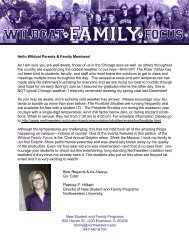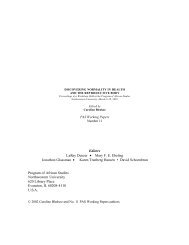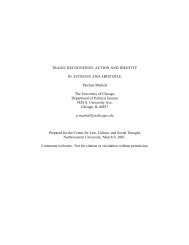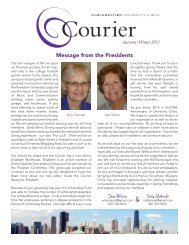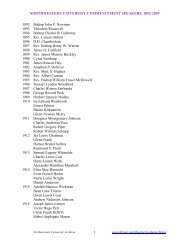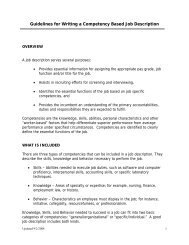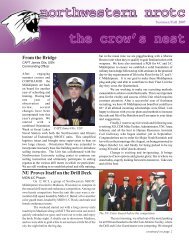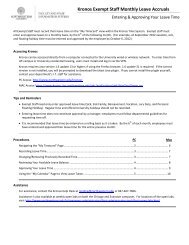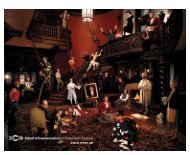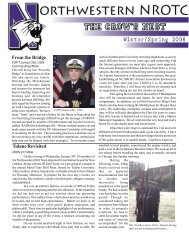Artistry Permits and Custom May Ordain - Northwestern University
Artistry Permits and Custom May Ordain - Northwestern University
Artistry Permits and Custom May Ordain - Northwestern University
Create successful ePaper yourself
Turn your PDF publications into a flip-book with our unique Google optimized e-Paper software.
38<br />
covered with a thin silk veil.” 168 In seclusion, Malindian women dressed “with great<br />
display, wearing silk robes, <strong>and</strong> on their neck, arms, <strong>and</strong> feet, chains of gold <strong>and</strong> silver.” 169<br />
While it is clear that the seclusion of women was common, it is unclear whether or not<br />
politically powerful women followed purdah. Sultanas may have been subjected to<br />
seclusion near the end of the sixteenth century, as an English report of 1599 recorded that<br />
the Sultana of Domoni “would not be seene.” 170<br />
168 F. Pigafetta, A Report of the Kingdom of Congo <strong>and</strong> of the Surrounding Countries drawn out of the Writings <strong>and</strong><br />
Discourses of the Portuguese Duarte Lopez. London, 1881. 123.<br />
169 Ibid.<br />
170 “The Voyage of Captaine John Davis to the Easterne India, Pilot in a Dutch Ship; Written by himselfe, [1599]”<br />
in The Voyages <strong>and</strong> Works of John Davis the Navigator. Ed. A. Markham. London, 1930. 137-8.<br />
171 “Descrição da Situação, Costumes e Produtos de alguns lugares de África, ca. 1518,” DPMAC. 5:366.<br />
172 Barbosa, The Book of Duarte Barbosa, 26-7.<br />
173 A. Vespuccius, The Voyage from Lisbon to India, 1505-6, being an account of the journal by Albericus Vespuccius.<br />
Ed. C. Coote. London, 1894. 29.<br />
174 F. Pigafetta, A Report of the Kingdom of Congo, 120-1.<br />
175 “Descrição da situação, costumes e produtos de alguns lugares de África, ca. 1518, Edoard Barbuse,” DPMAC.<br />
5:380.<br />
While rich silk <strong>and</strong> cotton clothing was a status symbol in the Swahili world, most visitors<br />
to the coast noticed women’s jewelry, such as gold (makazi wa thahabu) <strong>and</strong> silver (makazi<br />
wa fetha), more than any other adornment. An anonymous description of Kilwa reported<br />
that women were “well appareled wearing a lot of gold <strong>and</strong> silver in chains <strong>and</strong> many<br />
bangles which they wear on their arms <strong>and</strong> legs.” 171 Barbosa commented that Kilwan<br />
ungwana women were not only “finely clad in many rich garments of gold <strong>and</strong> silk <strong>and</strong><br />
cotton” but wore “much gold <strong>and</strong> silver in chains <strong>and</strong> bracelets . . . on their legs <strong>and</strong> arms,<br />
<strong>and</strong> many jeweled earrings in their ears.” 172 A participant in the plunder of Kilwa in 1505<br />
recalled, “We found therein such great booty of gold, of silver <strong>and</strong> pearls, of golden pieces,<br />
<strong>and</strong> of sundry precious wares, that it was impossible to reckon their value.” 173 Yet almost<br />
fifty years later Kilwan women were again described as wearing “ornaments of gold <strong>and</strong><br />
jewels on the arms <strong>and</strong> neck, <strong>and</strong> hav[ing] large quantities of silver vessels,” a testament to<br />
the wealth of the city-state even in its decline. 174<br />
On Pemba, Zanzibar, <strong>and</strong> Mafia, women could likewise “adorn themselves with<br />
gold <strong>and</strong> jewels brought from Çofala” 175 since the isl<strong>and</strong>s’ direct trade in foodstuffs with<br />
much of the coast underwrote considerable ungwana material accumulation. Among<br />
Zanzibari women, the “wealthier [went] about perfumed with amber <strong>and</strong> musk” <strong>and</strong><br />
generally dressed “in the manner of Malindi,” reported one visitor. 176 Barawan women,<br />
176 G. de San Bernadino, Itinerario. in SD, 156.



